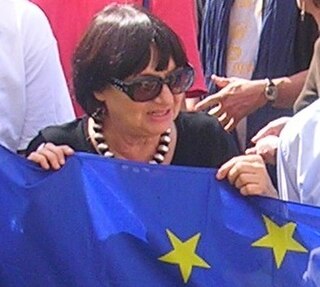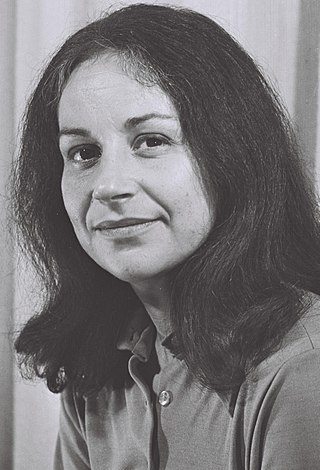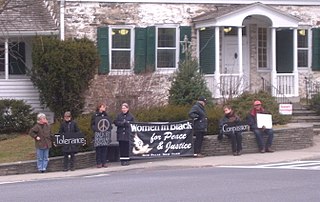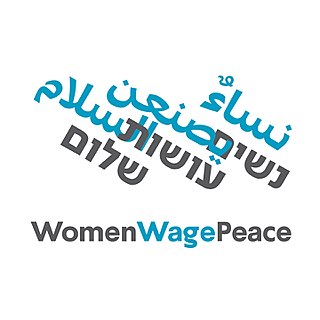
Gush Shalom is an Israeli peace activism group founded by Uri Avnery in 1993. Avnery–a former journalist, Irgun and Knesset member–also led the organization till his death in 2018. In 2010, the American Friends Service Committee has described the group as "one of Israel's most influential peace organizations".

Luisa Morgantini is an Italian former Member of the European Parliament. She was elected as independent with the Communist Refoundation Party ticket and sat with the European United Left - Nordic Green Left group.

Black Laundry is a lesbian, gay, bisexual, transgender, and queer (LGBTQ) organization that uses direct action to oppose Israeli occupation of Palestinian land and advocate for social justice. The group made its first public appearance in 2001 after the second Intifada, where 250 members marched in the Tel Aviv Pride Day parade with the message 'No Pride in Occupation.'
New Jewish Agenda (NJA) was a multi-issue membership organization active in the United States between 1980 and 1992 and made up of about 50 local chapters. NJA's slogan was "a Jewish voice among progressives and a progressive voice among Jews." New Jewish Agenda demonstrated commitment to participatory (grassroots) democracy and civil rights for all people, especially those marginalized within the mainstream Jewish community. NJA was most controversial for its stances on the rights of Palestinians and Lesbian and Gay Jews.

Marcia Judith Freedman was an American-Israeli activist on behalf of peace, women's rights, and gay rights. In 1969, she immigrated to Israel where she helped establish and lead the feminist movement in the 1970s. She was a member of the Knesset from 1974 to 1977.

Homosexuality in the Palestinian territories is considered a taboo subject; lesbian, gay, bisexual, and transgender (LGBTQ) people experience persecution and violence. There is a significant legal divide between the West Bank and the Gaza Strip, with the former having more progressive laws and the latter having more conservative laws. Shortly after the Jordanian annexation of the West Bank in 1950, same-sex acts were decriminalized across the territory with the adoption of the Jordanian Penal Code of 1951. In the Egyptian-occupied Gaza Strip and under Hamas' rule, however, no such initiative was implemented.

Ruchama Marton is an Israeli psychotherapist, psychiatrist, and feminist, and the founder of Physicians for Human Rights-Israel.

Smadar Lavie is a professor emerita of anthropology at the University of California Davis, and a Mizrahi anthropologist, author, and activist. She specializes in the anthropology of Egypt, Israel and Palestine, emphasizing issues of race, gender and religion. She received her doctorate in anthropology from the University of California at Berkeley (1989).

Mustafa Barghouti is a Palestinian physician, activist, and politician who serves as General Secretary of the Palestinian National Initiative (PNI), also known as al Mubadara. He has been a member of the Palestinian Legislative Council since 2006 and is also a member of the Palestine Liberation Organization (PLO) Central Council. In 2007, Barghouti was Minister of Information in the Palestinian unity government. He is an advocate of the use of non-violence and civil disobedience to confront Israel's occupation of the West Bank and Gaza Strip.
Bat Shalom is one of the organizations of the Coalition of Women for a Just Peace. They are a feminist Israeli-Palestinian non-governmental organization, a merging of two previous organizations: Israel's Bat Shalom, and the Jerusalem Center for Women. They work together through another group, The Jerusalem Link. Their main goal is to resolve the Israeli-Palestinian conflict, with resolutions for Israeli and Palestinian women as their highest priorities. They also created a list of specific goals in mind that they believe must be essential to the overall resolution of the Israeli-Palestinian conflict.

The Coalition of Women for Peace is an umbrella organization of women's groups in Israel, established in November 2000. It describes itself as "a feminist organization against the occupation of Palestine and for a just peace.". CWP says that it is "committed to ending the occupation and creating a more just society, while enhancing women’s inclusion and participation in the public discourse".

Women in Black is a women's anti-war movement with an estimated 10,000 activists around the world. The first group was formed by Israeli women in Jerusalem in 1988, following the outbreak of the First Intifada.

Women Wage Peace is an Israeli grassroots peace movement, formed shortly after the Gaza War in 2014. Its primary goal is to prevent future wars and promote a non-violent, respectful, and mutually accepted solution to the Israeli-Palestinian conflict, with the active participation of women from diverse political and religious backgrounds through all stages of negotiations.

Haya Shalom is a lesbian feminist and human rights activist. She graduated from Hebrew University in Jerusalem in History Studies. Shalom was nominated among 1000 women for The Nobel Peace Prize. She is of Sephardic extraction.
The Jerusalem Center for Women(JCW) is a feminist organization, established in 1994 as a part of a collaborative feminist effort with Bat Shalom known as the Jerusalem Link. The Jerusalem Center for Women aims to reduce hostilities between Palestine and Israel, as well as advocacy for women's rights in both areas. Most of the tactics utilized by this organization, include advocacy and workshops for community involvement, in addition to voice therapy sessions. The group receives support through international funding and attention.

Gabriela "Gaby" Lasky Schutz is an Israeli politician, attorney, feminist, human rights activist, and social activist. From 2021 until 2022 she served as a member of the Knesset representing Meretz. She was a member of the Tel Aviv city council between 2013 and 2018, representing Meretz, and was the secretary general of the Israeli peace organization Peace Now. As a human rights attorney, Lasky documents and responds to cases of torture, false imprisonment, and police brutality within Israel, Gaza, and the West Bank.

Hannah Safran is an Israeli feminist, activist and researcher. She is one of the founders of the Coalition of Women for Peace and Women in Black.

Aswat - Palestinian Feminist Center for Gender and Sexual Freedoms, also known as Aswat, is an Israel-based feminist organization that advocates for lesbians and other LGBT women in the Palestinian community. The group started as an online platform in 2000, started having the regular meetings in 2001 and was joined Kayan-Feminist Organization in 2003 as an independent project, making it the first Palestinian organization for Queers and lesbians (LBTIQ). It was initially membership-based, but has since transitioned to a movement-based structure. It is based in Haifa, Israel.
Ghadir Shafie is a Palestinian activist and feminist. She is the co-director of Aswat, an organization of queer Palestinian women, which she joined in 2008.
Yan María Yaoyólotl is a lesbian feminist activist and a Mexican feminist artist, painter, curator and cultural promoter. She was co-founder of the groups Lesbos (1977) and Oikabeth (1978) which have their origins in the lesbian-feminist movement in Mexico.














